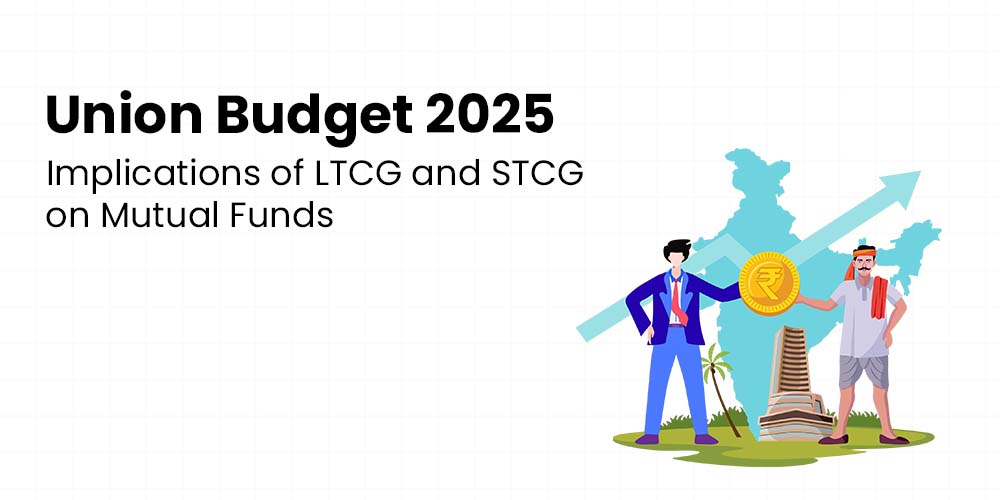Union Budget 2024: Implications of LTCG and STCG on Mutual Funds
Introduction
The Union Budget 2024 has introduced significant changes to the taxation of mutual funds, affecting both short-term and long-term capital gains. These changes are pivotal for investors to understand as they navigate the financial landscape. Finance Minister Nirmala Sitharaman announced notable modifications in the tax rates for various financial assets, with a specific focus on mutual funds. This article delves into these changes, exploring how they impact investors and providing insights into optimal strategies for managing mutual fund investments.
Short-Term Capital Gains (STCG)
Changes in STCG Rates:
Previously, short-term capital gains (STCG) on specified financial assets were taxed at 15%. However, the new budget has increased this rate to 20%. This hike applies specifically to equity mutual funds and shares with a holding period of less than 12 months. The rationale behind this increase is to discourage short-term speculative trading and promote long-term investments.
Impact on Investors:
For investors who frequently trade equity mutual funds or shares, this increase in STCG tax will result in higher tax liabilities. It may also influence trading behavior, encouraging investors to hold their investments for longer periods to benefit from lower long-term capital gains (LTCG) tax rates.
Strategic Adjustments:
To mitigate the impact of higher STCG taxes, investors might consider altering their trading strategies. Emphasizing longer holding periods can not only reduce tax burdens but also align with a more stable investment approach, potentially yielding better returns over time.
Long-Term Capital Gains (LTCG)
Revised LTCG Rates:
The budget has elevated the long-term capital gains (LTCG) tax rate from 10% to 12.5%. This updated rate is applicable to equity mutual funds and shares that have been held for more than 12 months. Additionally, for properties and mutual funds held for a minimum of 24 months, with over 65% of their assets invested in debt and money market instruments, Long-Term Capital Gains (LTCG) will be taxed at a rate of 12.5%.
New Exemption Limits:
The threshold for Long-Term Capital Gains (LTCG) exemption has been elevated from Rs. 1 lakh to Rs. 1.25 lakh. This increment offers modest relief to small investors, allowing them to offset some of the additional tax burdens brought by the increased rates.
Impact on Long-Term Investors:
While the marginal increase in LTCG tax from 10% to 12.5% means slightly higher taxes for long-term investors, the higher exemption limit somewhat mitigates this impact. Long-term investors will benefit from this higher threshold, which can be strategically used to optimize tax efficiency.
Capital Gains Harvesting:
Investors can leverage capital gains harvesting up to the new exemption limit of Rs. 1.25 lakh each year. This strategy involves selling and then repurchasing assets to realize gains within the tax-free threshold, thereby reducing overall tax liabilities over time.
Comparative Analysis of Investment Options
Equity Mutual Funds:
Despite the increased tax rates, equity mutual funds continue to be attractive investment options. Their potential for higher returns compared to other asset classes, coupled with the benefits of diversification, makes them a favorable choice for many investors.
Debt Mutual Funds:
The taxation on debt mutual funds remains unchanged, with these funds continuing to be taxed as per the investor's tax slab. This consistency provides stability for fixed-income investors, although the unchanged rates might seem less appealing compared to the more lucrative equity options.
Fixed Deposits and Bonds:
The tax treatment for fixed deposits, debt mutual funds, bonds, and market-linked bonds remains unchanged. This stability is a double-edged sword; while it provides predictability, it may not be as attractive given the higher potential returns from equity investments, despite their higher tax rates.
Expert Insights
Market Reactions:
Market Analysts, noted that the rationalization of capital gains tax affects different asset classes differently. The removal of indexation benefits for real estate investments could significantly impact home sellers. However, the market's initial negative reaction to increased capital gains tax for equity markets is expected to stabilize as investors adjust to the new norms.
Long-Term Prospects:
Market Analysts, emphasized that despite the increased LTCG, equity mutual funds remain excellent long-term investment options. The government's focus on fiscal prudence and infrastructure spending is expected to bode well for the economy, supporting long-term investment growth.
Behavioral Shifts:
Market Analysts, highlighted that the increased STCG tax rate might deter speculative trading and encourage long-term investments. This shift could lead to a more stable and less volatile market environment, benefiting both individual investors and the broader economy.
Conclusion
The Union Budget 2024 introduces significant changes to the taxation of mutual funds, with increased rates for both STCG and LTCG. While these changes present new challenges for investors, they also offer opportunities for strategic tax planning and optimized investment approaches. By understanding the implications of these tax revisions and adjusting their investment strategies accordingly, investors can navigate the evolving financial landscape and continue to achieve their financial goals.
Frequently Asked Questions
-
How has the STCG tax rate changed for mutual funds?
The tax rate for short-term capital gains (STCG) has risen from 15% to 20% for certain financial assets, such as equity mutual funds and shares held for under 12 months.
-
What is the new LTCG tax rate for mutual funds?
The LTCG tax rate for equity mutual funds and shares held for more than 12 months has increased from 10% to 12.5%.
-
What is the new exemption limit for LTCG?
The threshold for Long-Term Capital Gains (LTCG) exemption has been elevated from Rs. 1 lakh to Rs. 1.25 lakh.
-
How does the taxation on debt mutual funds and fixed deposits change?
The taxation on debt mutual funds, fixed deposits, bonds, and market-linked bonds remains unchanged, continuing to be taxed as per the investor's tax slab.
-
How can investors mitigate the impact of higher STCG taxes?
Investors can mitigate the impact by adopting longer holding periods and leveraging strategies such as capital gains harvesting to optimize tax efficiency.
Disclaimer: This blog is dedicated exclusively for educational purposes. Please note that the securities and investments mentioned here are provided for informative purposes only and should not be construed as recommendations. Kindly ensure thorough research prior to making any investment decisions. Participation in the securities market carries inherent risks, and it's important to carefully review all associated documents before committing to investments. Please be aware that the attainment of investment objectives is not guaranteed. It's important to note that the past performance of securities and instruments does not reliably predict future performance.




